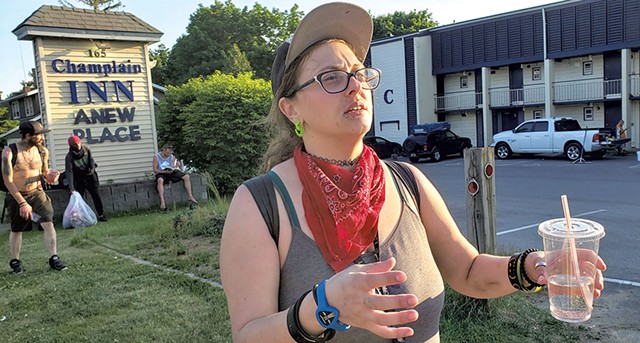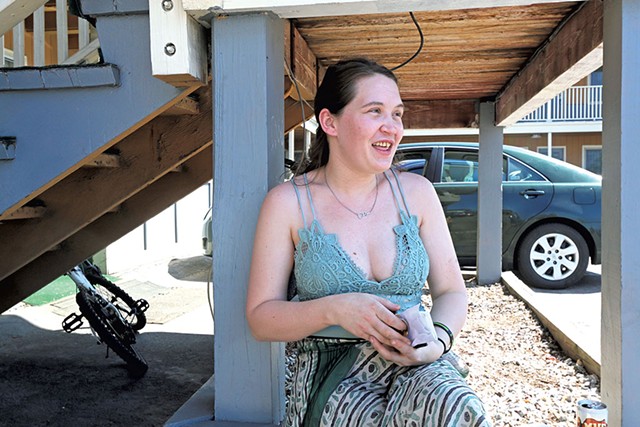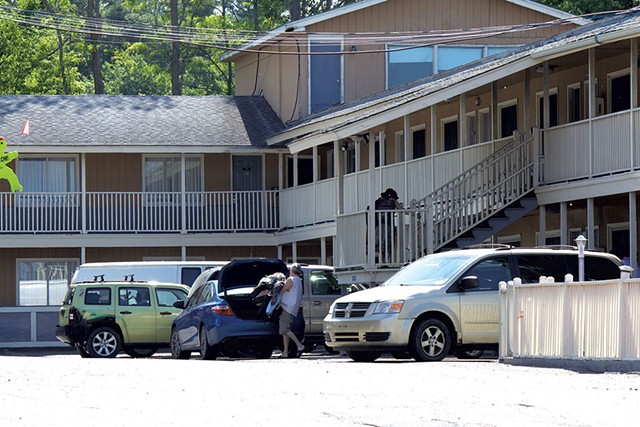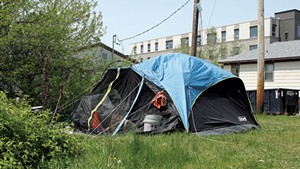
- Kevin Mccallum ©️ Seven Days
- Natasha Doolan
Natasha Doolan knew she would be kicked out of the Quality Inn in Colchester last Thursday, and she scrambled to avoid living on the streets again.
She hoped that she and a guy she's been seeing could move in together, but they couldn't find a place they could afford. She'd landed a $14-an-hour job as a parking attendant but hadn't started yet. Doolan said she even tried to get into a program for women fleeing domestic violence but was kept on hold so long that her cellphone battery nearly died. The caseworkers didn't believe she was a victim, she said.
So, last Thursday afternoon, she found herself homeless again, one of the people kicked out of a motel room as an emergency housing program wound down. She dragged several bags stacked on a broken suitcase toward the former Champlain Inn on Shelburne Road in Burlington, where she was able to get a shared room for the night in the city's emergency shelter.
"I feel like it's a little unfair to kick everybody out to a free-for-all in the streets," Doolan said as she waited in the hot parking lot, a red bandana around her neck. "It just kind of sucks."
Last week, the state stopped paying for motel rooms for 800 people, including her. Another 2,000 people — considered more vulnerable because of their ages or medical conditions — could face the same fate on July 1, though many will likely qualify for an additional 28 days.
Housing advocates have warned that, as the program ends, desperate people will be forced into shelters and unsanctioned encampments. Last week offered a glimpse of where these people will likely turn: Some headed to shelters or to friends' homes; others picked up camping gear from groups that handed it out.
Housing advocate Brenda Siegel said the evictions were every bit as chaotic and traumatic as she and others had warned. Those kicked out included a person on oxygen, one recovering from recent hip surgery, and others struggling with heart problems or substance-use disorder, she said.
State Economic Services Division staffers tried to find people housing, but they were overwhelmed and often said there was nothing they could do, Siegel said.
"The answer to everybody who maybe was going to be sleeping outside with a medical condition was, 'I'm so sorry for what's happening to you,'" she said. "That is not an acceptable way for us to behave as a state."
Human Services Secretary Jenney Samuelson painted a very different picture at a Tuesday press conference, one where most people found other places to go and downtowns and homeless service providers were not overwhelmed.
"So far, we feel like the transition has gone relatively smoothly," she said.
Some program participants told Seven Days they qualified for an extension to stay in a motel until July 1 or, if they were leaving, expressed optimism that they'd land on their feet.
"I'm happy to be out of there," Chelsea Barber said while departing the Travelodge on Shelburne Road in South Burlington, where she'd lived for four months. "I'm happy to be moving forward."

- Kevin Mccallum ©️ Seven Days
- Chelsea Barber
Barber, 31, loaded her belongings into a car with two men last Thursday morning and said she had plans to move in with her stepmother in South Burlington.
The Travelodge was the latest in a string of motels she's called home as she struggled with addiction during the pandemic. She was drawn to the Burlington area in part because of a local methadone clinic. She's been off heroin for nearly a year, something she attributes largely to the motel program. She's grateful to have a family member to stay with for now, but she worries about her ability to stay clean.
"If I wasn't going to stay with my step-mom, I'd probably be out using," she said.
For four months, Nathan Triplett, 19, also lived at the Travelodge, which he called "one of the weirder" places he's stayed. After loading up his Toyota RAV4 last Thursday morning, he planned to leave Vermont to visit a friend because he can't afford an apartment in Burlington. The program had given him a roof over his head and allowed him to save some money, he said.
"It gave me the time and space to be a basic human," Triplett said.
Jonathan Farrell, executive director of the Committee on Temporary Shelter, said his team was working with about 30 households in Chittenden County who left the motel program on June 1. As of last week, two had found permanent housing and seven others planned to stay with family or friends. Another seven households planned to camp someplace; COTS has distributed some tents and equipment.
Others have chosen to leave the state, Farrell said.
"We've been able to, when people say, 'I have family in Massachusetts,' make a phone call, talk to the family member and say, 'OK, here's the bus ticket,' 'Here's the plane ticket,'" he said.
Some in the motels didn't seem to believe the evictions were really going to happen, he said. Now that they had, they were just going to "wing it," Farrell said.
Jennifer Provost, 43, has been living in the Travelodge since last November with her 14-year-old son. Having a child under 18 allows her to stay until at least July 1, and possibly another 28 days after that.
She's grateful for the program but outraged at its cost — $129 per night, or $3,870 for her last month. That kind of money should be directed toward permanent affordable housing, she said.
Despite having a voucher for 12 to 18 months of rental assistance through the HOME program, Provost said she can't find a place that will take it. The program is run through Vermont's Office of Economic Opportunity and the Champlain Valley Office of Economic Opportunity.
"I get that they want to eliminate [the motel] program. It makes sense," she said. "But you can't not give us any options on ways to get out of it."
She predicted that many of the people leaving motels were going to gravitate to downtown Burlington or to the Lake Champlain waterfront.
The waterfront is where Tony Pickard, 33, and Ana Winn, 57, plan to camp when they ultimately have to move.
The pair, who said they came to Vermont from Florida because of the benefits for housing and food stamps, had been living at the Travelodge for eight months when they were instructed to leave.
Last Thursday morning, a worker from the Economic Services Division found them another room at the North Star Motel in Shelburne. So Pickard spent the morning hauling their stuff from the Travelodge to a narrow storage unit across the street behind Denny's.
"Even if you're homeless, it's always stressful to move," Pickard said.
Winn said their plan was for Pickard to set up a tent in the woods by the Burlington skate park, so they'd have a place to go in case they got kicked out of their new motel on July 1.
"I'm a Virgo, man," she said. "We've got backup plans for our backup plans."
Provost can't bring herself to consider camping. Sitting in her car at the motel watching others depart last week, she wiped away tears as she glimpsed what could be her future.
"I just cannot admit that it might get to that point, at least not yet," she said, "because that would mean admitting that my fate is that shitty, and I'm not doing that."
Her fate and others' will be considered when lawmakers return to Montpelier on June 20 to try to override Gov. Phil Scott's latest batch of vetoes, including of the state budget. The spending plan, which effectively ends the motel program, has become a point of contention within the Democratic and Progressive caucuses.

- Derek Brouwer ©️ Seven Days
- Residents leaving the Travelodge
Last month, lawmakers had an impassioned debate about the end of the program. Fearing a humanitarian crisis, some Democrats and Progressives voted no on the budget on May 12, though it passed the House with 90 votes.
Scott later vetoed the budget over unrelated tax and fee hikes. Now, to override his decision when legislators return for a veto session, the House would need 100 votes — 10 more than in May.
Rep. Mari Cordes (D-Lincoln), one of the leaders of the resistance, said the evictions have only emboldened the group of about 20 to 30 lawmakers.
"It makes us even more committed to helping on the front lines and also finding a legislative path forward," Cordes said. "It puts more personal and emotional energy behind our focus."
More than enough Democratic and Progressive lawmakers are willing to let the governor's veto stand if that would force a budget revision to "allow enough time for the process to work without unhousing anybody," she said.
Rep. Emma Mulvaney-Stanak (P/D-Burlington) said she and like-minded lawmakers are planning to outline several ways to redirect some of the $40 million in "flexible" funds to address the transition without robbing from other important programs.
One idea is to use money earmarked as matching funds for future federal infrastructure dollars to address the homelessness crisis now. Rep. Troy Headrick (P/D-Burlington) hinted at this during the budget debate last month when he lamented that $14 million had been "parked" until 2025 for such future uses.
House Speaker Jill Krowinski (D-Burlington) and her leadership team have been trying to assuage rebel lawmakers' concerns by underscoring the resources in the proposed budget that would help people transition to better housing options and to counter the accusations that lawmakers are responsible for the crisis.
Conor Kennedy, Krowinski's chief of staff, pointed to the $84 million in the plan that would immediately become available to help people find shelter. This includes $27 million for the general assistance emergency housing program and $19.4 million in flexible grants to homeless service providers.
Krowinski and Senate President Pro Tempore Phil Baruth (D/P-Chittenden-Central) have blamed the governor for failing to come up with a transition plan. Baruth called Scott's budget veto "the most flawed and harmful of any in recent memory" because it effectively froze funds meant to address the problem.
Attorneys from Vermont Legal Aid unsuccessfully sought to convince a judge to block the evictions just before they happened last week. One, Rebecca Plummer, said she blames the administration for failing to properly plan for the transition — and the legislature for failing to insist upon it.
"They are both complicit," Plummer said last week. "They've been pointing fingers at each other, and that's not helping anybody. It's a real fiasco."














Comments
Comments are closed.
From 2014-2020, Seven Days allowed readers to comment on all stories posted on our website. While we've appreciated the suggestions and insights, right now Seven Days is prioritizing our core mission — producing high-quality, responsible local journalism — over moderating online debates between readers.
To criticize, correct or praise our reporting, please send us a letter to the editor or send us a tip. We’ll check it out and report the results.
Online comments may return when we have better tech tools for managing them. Thanks for reading.